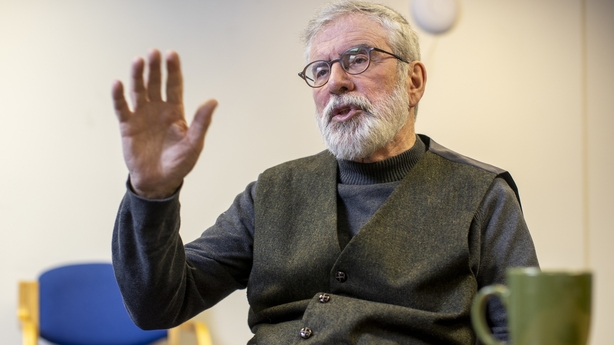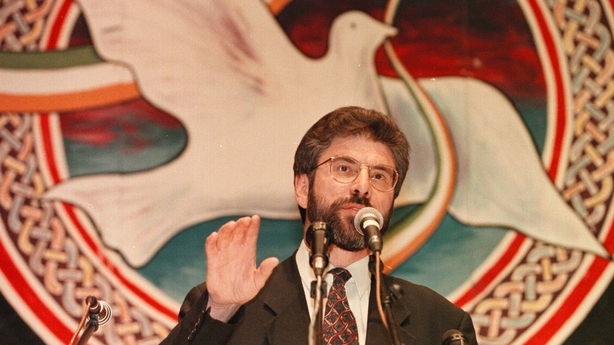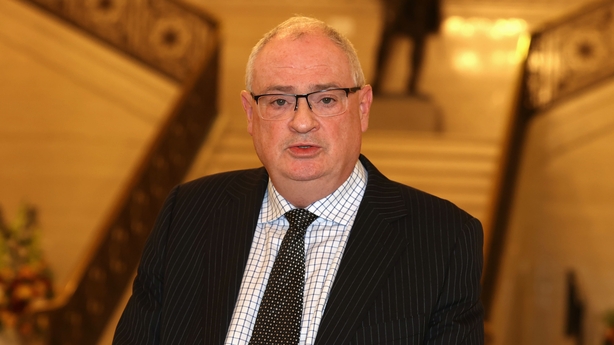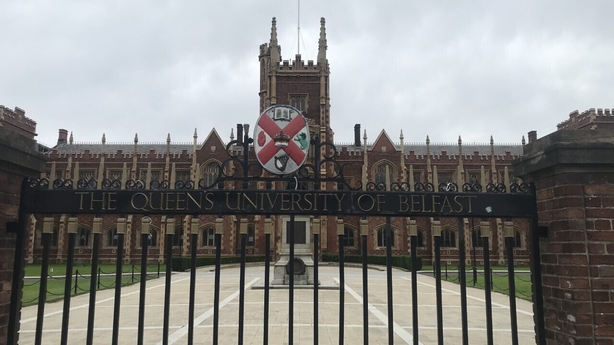Commissioner for Victims and Survivors in Northern Ireland Ian Jeffers says there is still a long way to go for reconciliation in Northern Ireland with "not enough progress" made since the Good Friday Agreement.
He said Nothern Ireland is a better place now but there is still an issue where communities live in the shadow of the Troubles.
Speaking on RTÉ's Morning Ireland, Mr Jeffers highlighted the importance of supporting young people in particular.
"We have got to consider we are a post-conflict society, we have inter-generational trauma, we have got to recognise that," he said.
"Ideally we need this peace."
He said it is about acknowledging that "we did bad stuff to each other" in the past and be focused on putting victims "front and centre" of all policy making for a stable future.
Regarding the Omagh bombing, he said there has been some progress at inquests and civil cases where families have received some information.
He said people want "acknowledgement and knowledge", which he said is "critical" for survivors.
While these families would love justice after so long it is "nearly impossible," Mr Jeffers said.
"Will we ever hear this concept of a new Commission being set up under the Bill that will encourage people to give information?," he asked.
"I think it's a nonsense. I think if people sat quiet for 30, 40 or 50 years about what they did they are not going to come forward now and tell their particular story."

'Flag of convenience'
Meanwhile, former Sinn Féin President Gerry Adams said young people who are turning to violence with loyalist paramilitaries or dissident republicans in Northern Ireland now are using it as "a flag of convenience".
"We can all of us make it very, very clear that there's no space, no need, and no rationale for any violent grouping in existence and those young people, we should be reaching out to them, and that's what Sinn Féin's trying to do," he said.
"Young people particularly need to have a sense of their own potential and need to have their rights and every child should have the ability to aspire and to actually get whatever his or her ambition is."
On the accusation by Tánaiste Micheál Martin that Sinn Féin has over-glorified what happened during the Troubles and has not responded sufficiently to victims of IRA violence, he said: "I think we all need to be careful about how we deal with the past, and I would take that from there Lyra McKee's sister.
"I won't take it from Micheál Martin. Micheál Martin glorifies rightly, if you like, the men and women of the IRA of Cork in his time.
"I don't glorify, I deal with the reality that people made a stand here.
"Let's look to the future in all of this. It's nothing short of ridiculous, but it's 25 years on without institutions in place. When Republicans are playing a very, very positive role.
"Here we are talking about the IRA. In God's name, no institutions in place.
"An Irish Government which is asleep at the wheel in terms of its responsibilities to lead to, to come into the gap, to be there, to be putting it up to a British government which has no instinct whatsoever for this place, right, wrong or indifferent, unionist or nationalist."

"I think the future is bright. I think we are going through some difficulties at the moment," Mr Adams said.
"But I think that whatever about families of victims, including families of the IRA, want to say and need to be heard and need to be respected, a Tánaiste, a former Taoiseach has a responsibility to lead us all out of this current difficulty."
Mr Adams praised the people who voted for the Good Friday Agreement.
"In terms of those who were part of the negotiations, I think all the parties to the negotiations deserve due credit," he said.
"I think that the DUP, Ian Paisley, for coming into the talks and for going into government with Martin McGuinness, deserve credit also.
"This shouldn't be a sort of a reminiscence, or even a victory lap. It's the next 25 years."
Mr Adams said he was one of those who argued very strongly for the Assembly and an inter-connected all-Ireland structure.
"One of the big pluses for Irish democracy and the agreement...was to get rid of the Government of Ireland Act and to agree that there would be a referendum on Irish unity," he said.
"So, what I would like to see is the Irish Government bringing together a Citizens’ Assembly to discuss all these matters, not to repeat Brexit, to have everybody there that want to have their say, and then the plan after that process of enlightenment and of education and information and planning then to have a referendum on our issue [Irish unity]."
'Huge body of work'
Mr Adams said the Irish government has a "huge body of work to do" as he accused it of not being proactive in its use of the British and Irish inter-governmental conference
"It has rarely been called," Mr Adams said.
"The Irish government has not been proactive on it. It deals with non-devolved matters. It deals with issues pertinent to our current situation."
He added that he thinks the DUP's Jeffrey Donaldson should be given limited time on the Windsor Framework deal.
The framework was unveiled in February as a means of adapting the post-Brexit Northern Ireland Protocol to deal with trade disruption between the region and the rest of the UK.
The deal has been formally signed off by the UK Government and the EU.
However the DUP, the largest unionist party in Northern Ireland, has expressed concerns about the framework and has shown no sign of returning to power-sharing at Stormont.
"He (Donaldson) is refusing to go into an Assembly over an issue which the Assembly has no authority for," Mr Adams said.
His comments come ahead of US President Joe Biden's visit to Belfast next week and he said he understands why the US leader will not be going to Stormont.
"Why would he go to an empty building? You may as well go to a wake," Mr Adams said.

UUP Assembly Member Steve Aiken and former party leader, has said a "much more peaceful society" in Northern Ireland should be celebrated by everyone.
He said on this 25th anniversary of the Good Friday Agreement everyone should be looking forward to the future but that it is important also to look back at the missed opportunities.
He said one issue for the unionist community was after the Agreement "the lack of decommissioning from the provisional IRA."
"The fact if that decommissioning happened when David (Trimble) wanted it to happen right at the beginning we could have built a very strong degree of stability going forward," he said.
There is a general "malaise" over the government in Northern Ireland and as a politician that is something he is trying to make better, he added.
He believes the DUP will return to Stormont.
"I have no doubt that after the end of the Council elections, I am talking to DUP MLA's all the time, they definitely do want to get back into getting the NI Assembly up and running," he said.

'Exciting time to be a young person'
The President of the Students Union at Queen's University Belfast has said it is "an exciting time to be a young person" as there is so much coverage about the Good Friday Agreement.
Emma Murphy, who was born two years after the agreement was signed, said: "I've been to the Lyric to see the agreement and I've seen how just so many people are having this wealth of inspiration from it.
"And I think that as a young person who hasn't had an experience of violence growing up at all, and all I've known is peace, it has been kind of really invigorating to see all of that.
"You kind of learn about the troubles and the Good Friday Agreement and what it meant to people through a completely different generation."
Speaking on RTÉ’s Morning Ireland, she said young people in Northern Ireland are concerned about the "bread and butter issues" across the UK and Ireland.
"The cost-of-living crisis is having a massive impact and the likes of housing, the climate emergency that we're all facing," Ms Murphy said.
"All of these issues are at the forefront of their minds, and they see a government that isn't sitting and if you're a young person somewhere else there’s more support available there.
"There's more interventions being made and political decisions that are being taken and it just that they have to face because these are massive life choices that they have to make."
She added that compared to the rest of Europe, Northern Ireland and some of its political parties have less female representation compared to the other parties.
Ms Murphy said "representation matters, and seeing women in positions of power just encourages that next generation completely.
"And so, if women don't see that happening themselves, they won't necessarily want to put themselves forward".
Queen’s University is hosting a major conference for the 25th anniversary of the Good Friday Agreement, which Ms Murphy is opening with a speech.
"I think that a lot of reflection will be taking place at the conference, and it does bring together a lot of different global players", she said.
"The main conversation that we should be having is about the future. What are the next steps?
"That we reinvent and keep the conversation pushing on because there needs to be some sort of development for young people to still live here afterwards."

